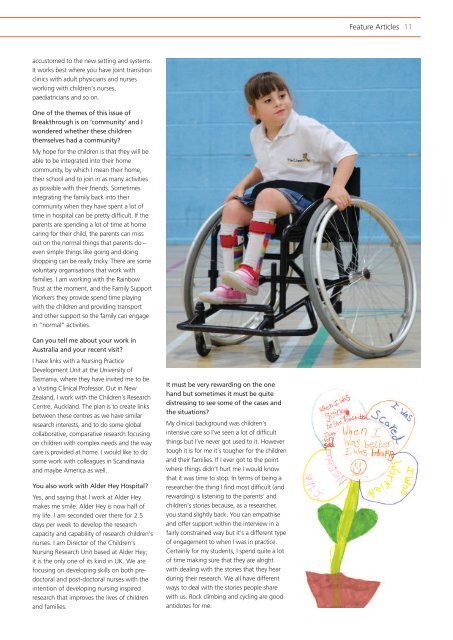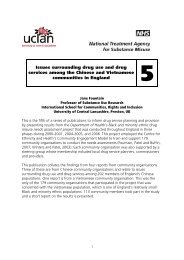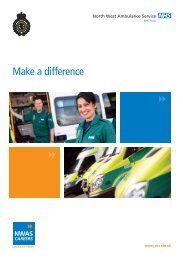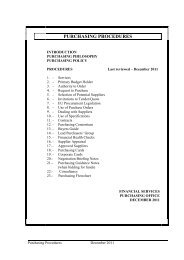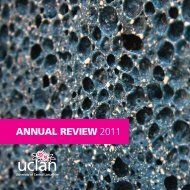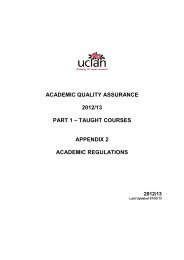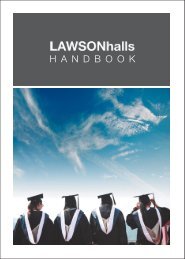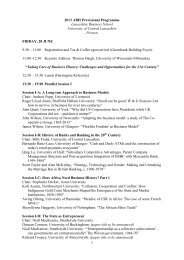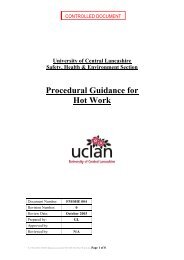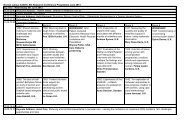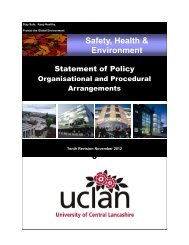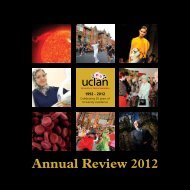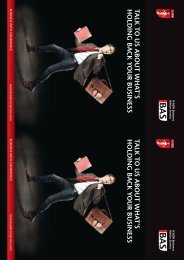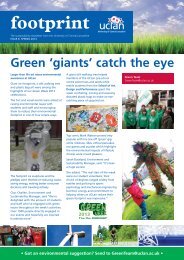Autumn 2011 Issue - University of Central Lancashire
Autumn 2011 Issue - University of Central Lancashire
Autumn 2011 Issue - University of Central Lancashire
You also want an ePaper? Increase the reach of your titles
YUMPU automatically turns print PDFs into web optimized ePapers that Google loves.
Feature Articles<br />
11<br />
accustomed to the new setting and systems.<br />
It works best where you have joint transition<br />
clinics with adult physicians and nurses<br />
working with children’s nurses,<br />
paediatricians and so on.<br />
One <strong>of</strong> the themes <strong>of</strong> this issue <strong>of</strong><br />
Breakthrough is on ‘community’ and I<br />
wondered whether these children<br />
themselves had a community?<br />
My hope for the children is that they will be<br />
able to be integrated into their home<br />
community, by which I mean their home,<br />
their school and to join in as many activities<br />
as possible with their friends. Sometimes<br />
integrating the family back into their<br />
community when they have spent a lot <strong>of</strong><br />
time in hospital can be pretty difficult. If the<br />
parents are spending a lot <strong>of</strong> time at home<br />
caring for their child, the parents can miss<br />
out on the normal things that parents do –<br />
even simple things like going and doing<br />
shopping can be really tricky. There are some<br />
voluntary organisations that work with<br />
families. I am working with the Rainbow<br />
Trust at the moment, and the Family Support<br />
Workers they provide spend time playing<br />
with the children and providing transport<br />
and other support so the family can engage<br />
in “normal” activities.<br />
Can you tell me about your work in<br />
Australia and your recent visit?<br />
I have links with a Nursing Practice<br />
Development Unit at the <strong>University</strong> <strong>of</strong><br />
Tasmania, where they have invited me to be<br />
a Visiting Clinical Pr<strong>of</strong>essor. Out in New<br />
Zealand, I work with the Children’s Research<br />
Centre, Auckland. The plan is to create links<br />
between these centres as we have similar<br />
research interests, and to do some global<br />
collaborative, comparative research focusing<br />
on children with complex needs and the way<br />
care is provided at home. I would like to do<br />
some work with colleagues in Scandinavia<br />
and maybe America as well.<br />
You also work with Alder Hey Hospital?<br />
Yes, and saying that I work at Alder Hey<br />
makes me smile. Alder Hey is now half <strong>of</strong><br />
my life. I am seconded over there for 2.5<br />
days per week to develop the research<br />
capacity and capability <strong>of</strong> research children’s<br />
nurses. I am Director <strong>of</strong> the Children’s<br />
Nursing Research Unit based at Alder Hey;<br />
it is the only one <strong>of</strong> its kind in UK. We are<br />
focusing on developing skills on both predoctoral<br />
and post-doctoral nurses with the<br />
intention <strong>of</strong> developing nursing inspired<br />
research that improves the lives <strong>of</strong> children<br />
and families.<br />
It must be very rewarding on the one<br />
hand but sometimes it must be quite<br />
distressing to see some <strong>of</strong> the cases and<br />
the situations?<br />
My clinical background was children’s<br />
intensive care so I’ve seen a lot <strong>of</strong> difficult<br />
things but I’ve never got used to it. However<br />
tough it is for me it’s tougher for the children<br />
and their families. If I ever got to the point<br />
where things didn’t hurt me I would know<br />
that it was time to stop. In terms <strong>of</strong> being a<br />
researcher the thing I find most difficult (and<br />
rewarding) is listening to the parents’ and<br />
children’s stories because, as a researcher,<br />
you stand slightly back. You can empathise<br />
and <strong>of</strong>fer support within the interview in a<br />
fairly constrained way but it’s a different type<br />
<strong>of</strong> engagement to when I was in practice.<br />
Certainly for my students, I spend quite a lot<br />
<strong>of</strong> time making sure that they are alright<br />
with dealing with the stories that they hear<br />
during their research. We all have different<br />
ways to deal with the stories people share<br />
with us. Rock climbing and cycling are good<br />
antidotes for me.


